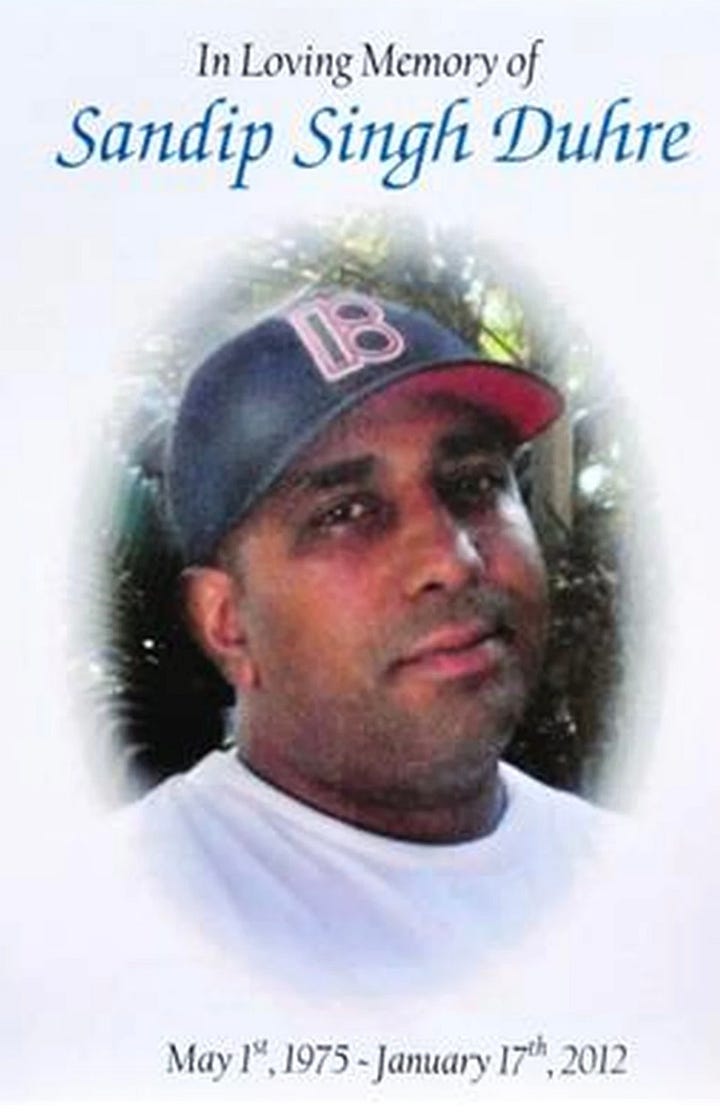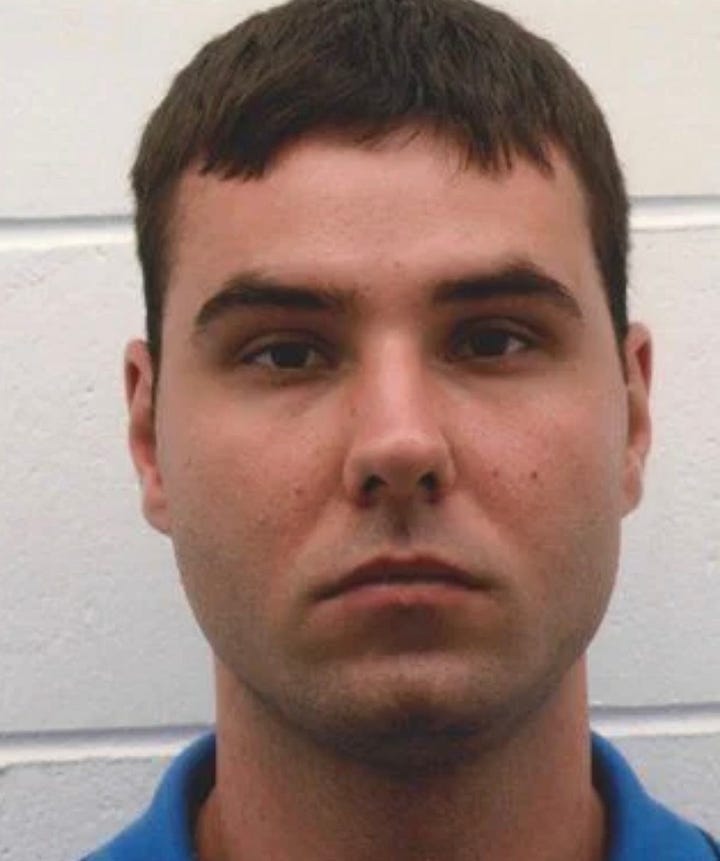Contract killer Dean Wiwchar, the Wolfpack's 'best hitter,' finally pleads guilty to 2012 Wall Centre shooting
When police advised Wiwchar he was under arrest for first degree murder, he famously asked 'which one?' His legal saga underlines the challenges faced by the criminal justice system

Just moments after BC Supreme Court Justice Kathleen Ker accepted Dean Wiwchar’s guilty pleas on two counts of murder conspiracy, she departed from her script to speak directly to the contract killer standing in front of her.
“Mr. Wiwchar, you should write your story,” she told him, a personal statement to deliver during the sentencing hearing. “People need to know more about you. I know some aspects. It’s up to you.” Wiwchar briefly seemed ready to speak, then sat back down.
It was a uniquely informal, human moment October 30 in an otherwise brisk and businesslike BC Supreme Court hearing that ended a 13-year murder investigation. Wiwchar, a slender man about six foot three, wearing a carefully groomed beard, trimmed haircut and black-framed glasses, had the earnest appearance of a financial advisor or tech professional.
Yet it’s easy to imagine the tales Wiwchar could tell about his busy career as a killer, the very dangerous transnational crime network he worked for, and even the ties between his bosses and the Sinaloa Cartel. What other targeted shootings is Wiwchar familiar with? Or is Justice Ker thinking of childhood events that produced an 18-year-old with the criminal record of someone many years older?
Wiwchar’s latest court battle began with the brutal January 17, 2012, shooting of gang leader Sandip Duhre as he ate in the restaurant of Vancouver’s Sheraton Wall Centre. Wiwchar pleaded guilty to charges of conspiracy to murder Dhure and his partner, Sukh Dhak, who was gunned down a few months later by others.
With Wiwchar’s guilty pleas, all three of the key players in the Wall Centre shooting are finally sentenced and in jail. Wolfpack Alliance leader Larry Amero, a member of the Hells Angels’ Nomads, was convicted and sentenced along with friend and fellow Wolfpack boss Rabih Alkhalil in 2024. Alkhalil escaped from North Fraser Pretrial Centre in 2022 and was recently recaptured in Qatar.
That left Wiwchar, accused of walking into the crowded restaurant and shooting Dhure dead as scores of customers, including members of the Cuban women’s soccer team, scrambled to safety. Prosecutors argued he was the man hired by Amero and Alkhalil to kill Duhre in revenge for the Kelowna casino shootings a few months earlier that left Red Scorpion Jonathan Bacon dead, Amero critically injured and a woman in the car paralyzed for life. (Another woman was slightly injured, and gangster Jamie Riach escaped unharmed.)
Now Wiwchar, whose trial was separated from that of Amero and Alkhalil in 2022, faces many more years in prison on top of a lengthy sentence he is already serving for the 2012 murder of Toronto trafficker Johnny Raposo. At the heart of the Raposo murder conspiracy was a massive shipment of cocaine that had been purchased from the Sinaloa Cartel.


The 36-year-old drug trafficker, shot by Wiwchar on a contract with Alkhalil just six months after the Wall Centre shooting, was watching a soccer game in a College Street restaurant when he died. Wiwchar, then only 26, was arrested a few days later and has been in jail ever since with no prospect of release before 2037.
So, who is Dean Wiwchar and how did he become the Wolfpack Alliance’s first choice for contract killing at the age of 26? (Alkhalil called him “my best hitter.”)
He was raised in a middle-class family in the quiet Ontario town of Stouffville, northeast of Toronto, an unlikely incubator for a career killer. Yet parole documents obtained by the Vancouver Sun’s Kim Bolan in 2012 paint a disturbing picture of someone who didn’t “turn bad.”
On the contrary, Wiwchar seems never to have been good: a gang leader in high school, repeatedly suspended for violence, and responsible at the age of 18 for a wave of violent attacks around the region, robbing and stabbing people in their homes, at a restaurant or in their automobiles.
A hallmark of the crimes was their extreme violence: beating a restaurant employee with a bat even after he had emptied the cash register, slashing a homeowner across the face, stabbing a pool hall employee. Convicted of multiple aggravated assault and armed robbery charges, Wiwchar was sentenced to five years in prison and transferred to BC to serve his sentence, where it is probable he connected with Alkhalil.
Wiwchar subsequently was convicted three times for violent assaults on prison guards and found in possession of a weapon on ten occasions, but eventually was released in April 2009. Just a month later, he broke his leg when the car he was in rolled over in an incident in Maple Ridge. Wiwchar was driving drunk, using marijuana and had a considerable supply of weed in the car, along with a loaded gun.
His parole was revoked, but he was again released in 2010 despite another series of offences, which included assaults on prisoners and guards with his walker. (Wiwchar still walks with a pronounced limp as a result of the injury.) The National Parole Board’s conclusion: “you are an untreated violent offender and are assessed as posing a high risk for future violence.”
Upon release, Wiwchar went to work full-time for the Alkhalil family, relaxing in a large Surrey home with no visible means of support. After his arrest in the Raposo killing, police searching the home found wigs, false moustaches and beards, as well as elaborate makeup materials, false noses, latex masks, a bulletproof vest, handcuffs, seven handguns, an Uzi submachine gun, assault rifles and plenty of ammunition.
After the Raposo killing, Wiwchar briefly visited family in Stouffville before returning to Toronto, where he was finally arrested. When police told him he was under arrest for first-degree murder, he famously asked, “which one?”
Despite the years of incarceration, Wiwchar does not seem to be mellowing. Richmond News reporter Jeremy Hainsworth disclosed in 2024 that Wiwchar had been charged with attempting to escape from Surrey pretrial in July 2022. He is also charged with threatening a prison guard. Wiwchar pleaded guilty to the escape charges and was sentenced to an additional two years.
When Wiwchar’s case was severed from the Amero-Alkhalil trials in 2022, he fired his legal counsel and began representing himself with the assistance of a court-assigned lawyer. Months of closed-door procedural and evidentiary hearings followed, continuing right up to the day before his surprise guilty pleas. The full trial, originally scheduled to begin in July, will now not be necessary.
Wiwchar’s sentencing hearing is scheduled for November 14. Wiwchar will have a chance to make a statement. Justice Ker will then pronounce sentence.
Is there more to his story than the crimes of a violent sociopath? Will Wiwchar make a statement that sheds some light on his criminal career, the organization he served and how he got there? We’ll see. It’s doubtful.
Either way, Wiwchar’s conviction, 13 years after the crime, underlines the difficulties faced by the criminal justice system in confronting organized crime, which is driving the overdose crisis, the extortion wave, the murder rate and much else.
Wiwchar’s failed escape in 2022 underlines need for full disclosure of how Rabih Alkhalil escaped the same week
News coverage of Dean Wiwchar’s guilty pleas has revealed that the contract killer had earlier pleaded guilty to attempting to escape from North Fraser Pretrial Centre during the period between July 20 and 26, 2022.
Rabih Alkhalil, who had praised Wiwchar as “my best hitter,’ actually did escape the centre on July 21, 2022 and completely disappeared until his discovery and recapture in Qatar earlier this year.
The disclosure of Wiwchar’s unsuccessful attempt underlines the importance of full disclosure of the events around Alkhalil’s escape, which were a major humiliation for the Correction Services. How was one escape thwarted and another entirely successful? How did Alkhalil and Wiwchar communicate with their co-conspirators?
If nothing else, the few facts known about the escapes, both successful and otherwise, confirm Alkhalil’s enduring power and influence. After years of incarceration, his organization was able to spirit him out of prison and move him to the other side of the world.
The most comprehensive account of the Raposo murder and the Wolfpack Alliance can be found in The Wolfpack: The Millennial Mobsters Who Brought Chaos and Cartels to the Canadian Underworld, by Peter Edwards and Luis Horacio Najera, from which much of this material is drawn.



Holy Shit
I guess the understory will be interesting. I also guess that the illicit drug trade is the catalyst. And on it goes. People die preventable deaths, psychopaths like Wiwchar give us interesting stories but no resolution or even a hint of redemption. Organized crime prevails. We can't beat it; maybe we should pivot, and try to use them to save the lives of people who use drugs.